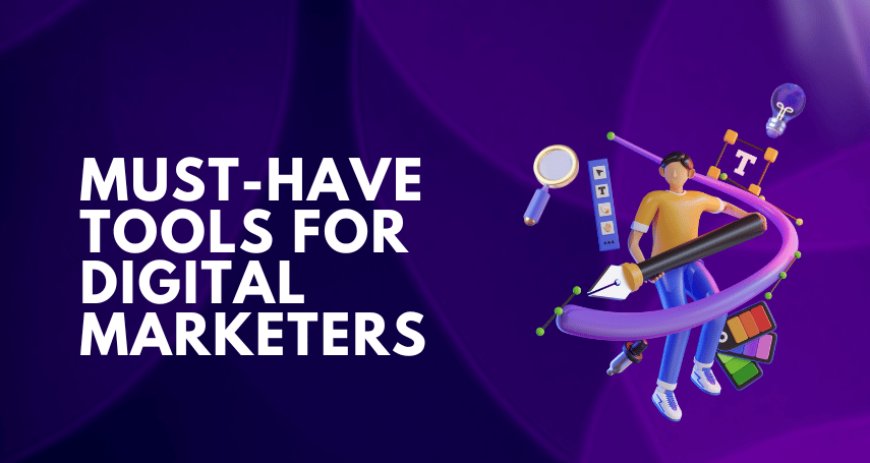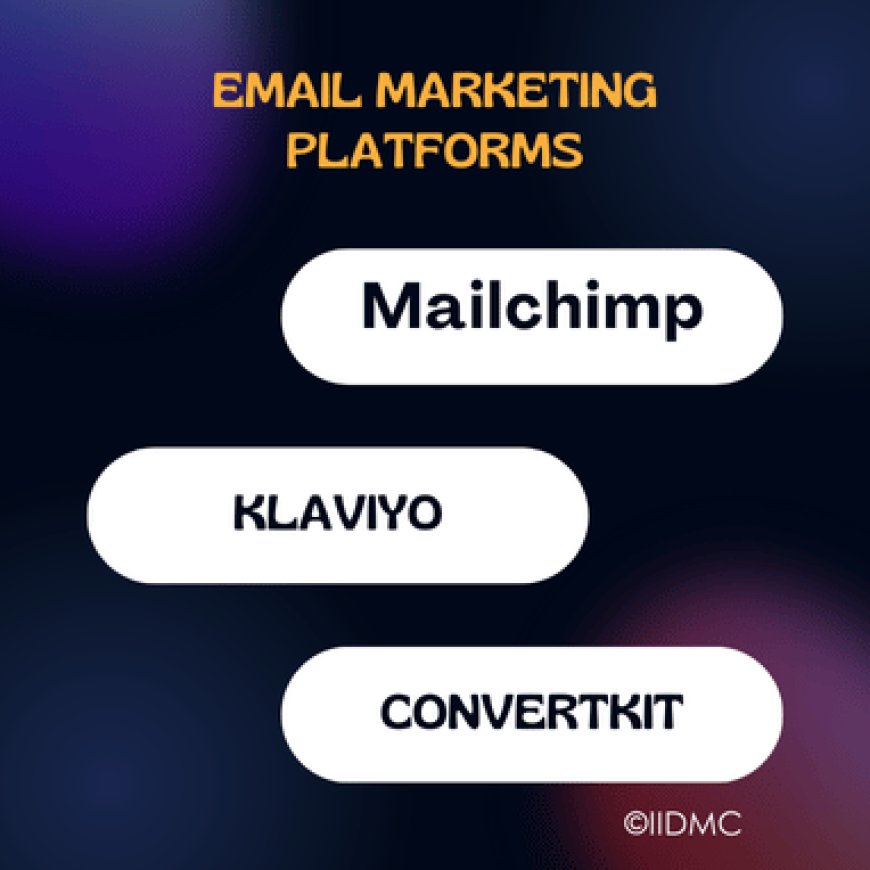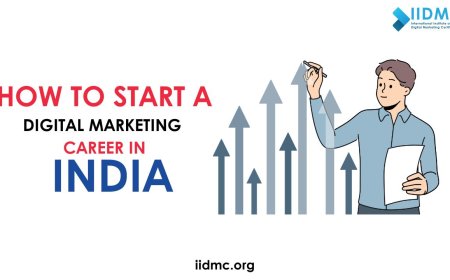Must-Have Tools for Digital Marketers
"Discover the essential tools every digital marketer needs to streamline workflows, boost productivity, and drive impactful results. From SEO optimization to social media management and analytics, explore top tools to enhance your digital marketing strategy today.

Having the right tools can make all the difference. The digital marketer of 2024 needs to stay on top of data, analyze campaigns in real-time, and connect with audiences in innovative ways. Here’s a look at some must-have tools that can help digital marketers create, manage, and grow successful campaigns this year.
Social Media Management Tools
Social media remains one of the most powerful channels for marketers, but managing multiple platforms can be challenging. Social media management tools streamline content planning, scheduling, and engagement, allowing marketers to keep everything organized and effective.
-
Hootsuite: One of the original social media management platforms, Hootsuite enables users to schedule posts, track engagement, and monitor trends. It’s great for teams who need to collaborate on social media strategies.
-
Buffer: Known for its simplicity, Buffer is an excellent option for marketers looking to schedule content, analyze performance, and manage multiple profiles without the extra frills.
-
Sprout Social: This platform offers robust analytics, content scheduling, and customer relationship management features, making it ideal for businesses aiming to build strong, long-lasting customer relationships.
SEO and Keyword Research Tools
Search engine optimization (SEO) is essential for making content discoverable. Keyword research tools and SEO platforms help marketers find the terms their audience is searching for, analyze competitor strategies, and track keyword rankings over time.
-
Ahrefs: Known for its comprehensive keyword research and backlink analysis, Ahrefs provides insights into what competitors are doing and helps marketers find high-value keywords to target.
-
SEMrush: A versatile tool for keyword research, competitor analysis, and rank tracking, SEMrush also offers on-page SEO guidance and technical SEO audits, making it a go-to for marketers wanting a full-suite SEO tool.
-
Ubersuggest: A cost-effective alternative that provides keyword suggestions, content ideas, and insights into what is working well for competitors.
Content Creation and Design Tools
Creating eye-catching visuals and engaging content is key to standing out. Content creation tools help marketers design appealing images, videos, and interactive content without needing to be a professional designer.
-
Canva: With its easy drag-and-drop interface and hundreds of templates, Canva is perfect for designing social media graphics, presentations, and more. Canva Pro also includes brand kits and premium templates.
-
Adobe Express: This tool is designed for users who want to create professional graphics without the complexity of full Adobe products. With templates and easy-to-use design options, it’s ideal for quick graphic needs.
-
CapCut: For video editing, CapCut offers free, user-friendly editing tools that allow marketers to create short-form videos optimized for social media. It’s particularly popular for platforms like TikTok and Instagram Reels.
Email Marketing Platforms
Email marketing is still one of the most effective ways to engage with customers. Email marketing tools make it easy to design emails, manage subscriber lists, and track how well campaigns are performing.

- Mailchimp: This platform has long been popular for its simplicity and effectiveness. Mailchimp offers templates, audience segmentation, and analytics, making it a favorite for marketers of all experience levels.
-
Klaviyo: Especially popular with e-commerce businesses, Klaviyo integrates well with online stores and offers advanced segmentation, allowing marketers to send personalized content based on customer behavior.
-
ConvertKit: Built for creators and influencers, ConvertKit focuses on simplicity and automation, making it easy to build email lists and nurture leads with minimal effort.
Analytics and Reporting Tools
Decisions based on data lead to better results, and analytics tools help marketers measure their campaigns’ effectiveness. They provide insights into what’s working, what needs improvement, and where to focus efforts next.
-
Google Analytics 4 (GA4): Google’s latest version of its analytics platform offers event-based tracking, improved reporting features, and cross-device data integration, making it ideal for a unified look at customer behavior.
-
Hotjar: For marketers looking to understand user behavior on their website, Hotjar provides heatmaps, session recordings, and feedback forms. This helps pinpoint where users might drop off and what elements need improvement.
-
Data Studio: Google’s Data Studio is a free reporting tool that allows marketers to create interactive dashboards and reports. It integrates seamlessly with Google Analytics, Ads, and other platforms, making data visualization straightforward.
Customer Relationship Management (CRM) Tools
A CRM system allows marketers to manage customer data, track interactions, and maintain strong relationships. It’s a must for businesses aiming to build customer loyalty and streamline their sales process.
-
HubSpot CRM: HubSpot offers a free CRM with essential features, along with paid upgrades for added functionality. It includes marketing automation, customer support tools, and insights into customer interactions.
-
Salesforce: Known for its robust capabilities, Salesforce allows for detailed customer insights, lead tracking, and automated workflows, which is ideal for large teams with complex sales processes.
-
Zoho CRM: A more budget-friendly option, Zoho offers customization options, sales tracking, and integration with other Zoho tools, making it a good choice for small to medium-sized businesses.
Marketing Automation Tools
Marketing automation tools help streamline repetitive tasks like email campaigns, social media posting, and ad management. They enable marketers to set up workflows that engage users at each stage of the funnel without constant manual intervention.
-
ActiveCampaign: This platform combines email marketing, automation, and CRM capabilities. ActiveCampaign is particularly useful for businesses looking to nurture leads through personalized email sequences.
-
Marketo: Geared toward enterprise-level marketing, Marketo provides automation for email, social media, and customer journey tracking, allowing for complex, multi-channel campaigns.
-
Pardot: Part of Salesforce, Pardot is a robust automation platform specifically designed for B2B marketing. It integrates well with Salesforce CRM, making it easy to track the entire customer journey.
Conversion Rate Optimization (CRO) Tools
Getting people to visit a website is just the first step; conversion rate optimization (CRO) tools help marketers turn those visitors into customers. These tools analyze user behavior and suggest changes that could improve conversion rates.
-
Optimizely: A top CRO platform, Optimizely offers A/B testing, personalization, and data analytics to help marketers experiment with website elements and improve user experience.
-
Unbounce: Known for its landing page builder, Unbounce is ideal for creating high-converting landing pages without needing a developer. It also includes A/B testing and lead generation tools.
-
Crazy Egg: With its heatmaps, scroll maps, and A/B testing features, Crazy Egg allows marketers to see where users are clicking, how far they scroll, and what elements are attracting the most attention.
Project Management and Collaboration Tools
Digital marketing often requires teamwork, from content creators to data analysts. Project management tools keep everyone on the same page and ensure that tasks are completed on schedule.
-
Asana: A popular project management tool, Asana lets teams organize tasks, set deadlines, and track progress. It’s particularly helpful for managing content calendars and campaign timelines.
-
Trello: Known for its visual board format, Trello is simple but effective for organizing tasks and collaborating with teams. It’s flexible and easy to use, making it a favorite for both beginners and experienced marketers.
-
Monday.com: This platform provides customizable workflows, making it adaptable for various marketing projects. It’s a good option for teams who need advanced organization and reporting features.
Digital marketing is all about efficiency, data-driven decisions, and targeted customer engagement. With tools like IIDMC (Integrated Intelligent Digital Marketing Campaigns), marketers can automate routine tasks, gain deeper audience insights, and improve campaign outcomes. Whether you’re a seasoned marketer or just starting, IIDMC and similar tools are essential for staying competitive and creating impactful campaigns.
These solutions streamline processes, enable precise audience targeting, and provide real-time analytics, helping marketers to adapt strategies swiftly and effectively, ensuring maximum reach and engagement





























